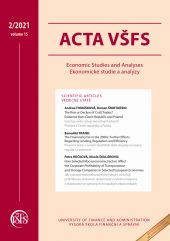Finanční krize v novém tisícitiletí: další dopady na úvěry, regulaci a ziskovost
The Financial Crisis in the 2000s: Further Effects Regarding Lending, Regulation and Efficiency
Author(s): Benedikt FrankSubject(s): Economy, Financial Markets
Published by: Vysoká škola finanční a správní, a.s.
Keywords: financial crisis;liabilities;lending;regulation;resilience;profitability;banks;
Summary/Abstract: The global financial crisis starting in 2007 was a central element of the new millennium and had a major impact on the global economy. This paper deals with the underlying causes and fundamental conditions as well as research and insights on the financial crisis in the area of liabilities and future lending, effects of regulations and bank resilience, as well as the changes in the banking industry in relation to the determinants of profitability. With three hypotheses developed on the basis of existing literature, that is critically evaluated and appraised, the paper aims to explore the global economic crisis from perspectives and origins beyond the often analysed triggers. The focus is on the pivotal point of the economic crisis: the banks and their international interconnectedness regarding lending, durability, and efficiency. Among other things, the findings revealed that the effect of the external funding shock on banks' domestic lending is significant, strong regulation, characterized as one-size-fits-all international best practice, is not always the blueprint for bank resilience and that efficiency has been a determining factor in bank profitability. Furthermore, no paradigm shift took place after the global economic crisis, and banks still seem to have to be rescued by the state in the event of bankruptcy due to their size.
Journal: Acta VŠFS - ekonomické studie a analýzy
- Issue Year: 15/2021
- Issue No: 2
- Page Range: 155-175
- Page Count: 21
- Language: English

